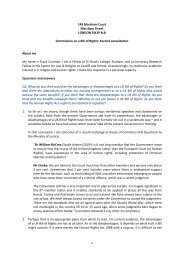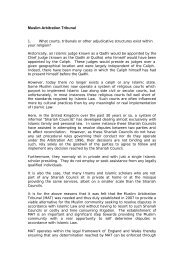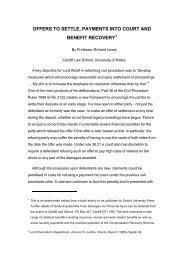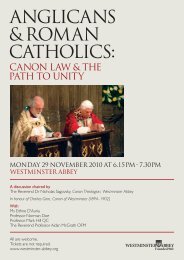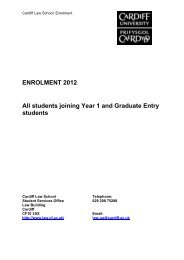Constitutional patriotism - Cardiff Law School
Constitutional patriotism - Cardiff Law School
Constitutional patriotism - Cardiff Law School
Create successful ePaper yourself
Turn your PDF publications into a flip-book with our unique Google optimized e-Paper software.
ANU E-PressDr Vito Breda<strong>Constitutional</strong> Patriotism & Identityand, at the same time, prevents those who are lacking resources from entering into apolitical debate (that is dominated by 'who' and 'to whom' narratives).The critique is accompanied by Habermas own solution, what he calls 'discursivedemocracy'. Cohen provides, I think, one of the most lucid renderings of the theory:The intuitive idea is that democracy, through its basic constitution,institutionalizes practices *…+ of free, open-ended, reflective reasoning aboutcommon affairs, and] tames and guides the exercise of coercive power byreference to those practices. To be sure, democracy does not guarantee thesubordination of the sovereign will and the coercive power it guides to [or by]the force of the better argument *…+ but it establishes conditions favorable tosuch subordination. 15What individuals lose in terms of a substantive protection of rights is compensated, inHabermas's deliberative democracy, by the increased level of rationality in thepolitical debate.At first sight, the trade-off suggested by Habermas might appear to be a relatively 'baddeal'. The substantive protection of individual rights might deliver a meagre defence againstan abuse of powers, but it might be reasonable to assume that individuals are unwilling torelinquish it. What would be the motivation for an individual to exchange a prerogative suchas the freedom of enterprise with a slightly more rational legal system? Habermas suggeststhat a side effect of a reasoned constitution system is an increase in the individual'sperception of ownership of his/her constitution. Specifically, individuals who are given theopportunity to freely select the issues that they might consider worthy of constitutionalaccommodation in a formal debate (e.g. in parliament or in a constitutional convention) willperceive decisions taken within those formal debates as representative of theirconstitutional identity. 16In this representation of democracy, Habermas outlines a consensual theory of legitimacy,according to which constitutional norms can be both rational and legitimate only whenpolitical interests are openly discussed. 17The prospect of achieving this rational legalsystem, Habermas points out, depends on, first, the partnership between an opendemocracy that guarantees the protection of the freedom of citizens to intervene in publicdebates and, second, on the equality of the speakers. These two limits ensure thatindividuals will be involved in the democratic process with the sole interest of disclosingknow, has not changed since the early days of his career—should be distinguished from his analysis of therelationship between legal systems and democracy, which has constantly evolved.15 J. Cohen, 'Reflections on Habermas on Democracy' (1999) 12(4) Ratio Juris 385, 386286 My Emphasis16 Cronin Ciaran, 'On the Possibility of a Democratic <strong>Constitutional</strong> Founding: Habermas and Michelman inDialogue' (2006) 19(3) Ration Juris 36617 Jürgen Habermas, The Theory of Communicative Action (1984)4 | P a g e



